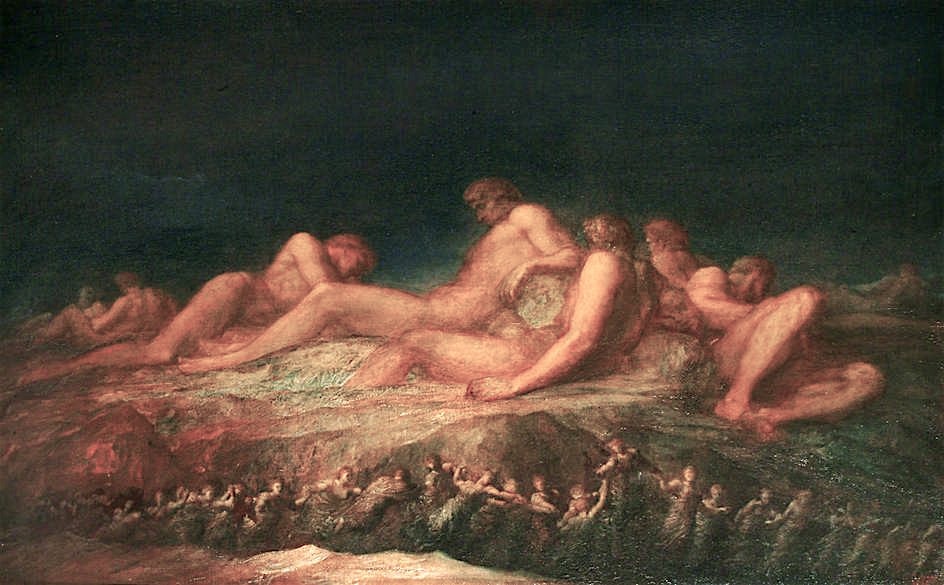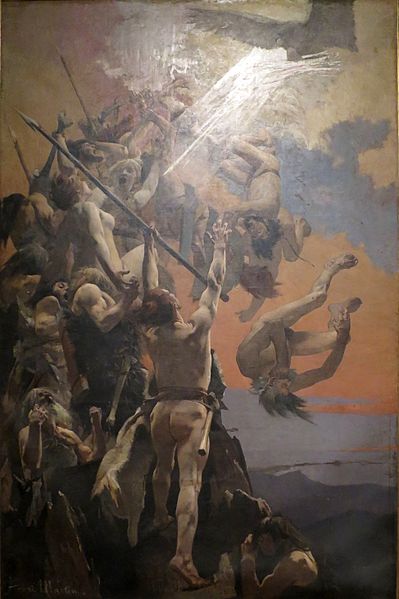CRIUS IN GREEK MYTHOLOGY
In Greek mythology, Crius was one of the first generation Titans, and thus one of the gods who preceded the rule of Zeus.
The Titan Crius
Crius is a Greek god who is little mentioned in surviving sources, with only a few details of the deity readily given.
Crius was one of the elder Titans, the twelve offspring of Ouranos (Sky) and Gaia (Earth), and thus brother to Cronus, Hyperion, Iapetus, Coeus, Oceanus, Rhea, Tethys, Theia, Themis, Mnemosyne and Phoebe.
Crius was one of the elder Titans, the twelve offspring of Ouranos (Sky) and Gaia (Earth), and thus brother to Cronus, Hyperion, Iapetus, Coeus, Oceanus, Rhea, Tethys, Theia, Themis, Mnemosyne and Phoebe.
Crius and the Castration of Ouranos
Crius comes to prominence during the downfall of his father Ouranos, who at one point was the supreme deity. Gaia though plotted with her sons, and when Ouranos descended from the heavens to mate with Gaia, Crius, Coeus, Hyperion and Iapetus held their father down, whilst Cronus castrated him with an adamantine sickle.
Crius was said to have held Ouranos down at the southern corner of the earth, and thereafter, Crius would be associated with the Southern Pillar of the Cosmos.
Crius was said to have held Ouranos down at the southern corner of the earth, and thereafter, Crius would be associated with the Southern Pillar of the Cosmos.
Crius God of Constellations
|
Nominally, Crius was called the Greek god of constellations, although his brother, Oceanus, also a certain power over the celestial bodies. As the god of constellations, Crius was also perhaps ruler over year as a time period, just as Hyperion was linked with days and months.
The name Crius is normally translated as Ram, and as such the god is often associated with constellation Aries; although the constellation itself is more normally said to be a depiction of Crius Chrysomallus, the Golden Ram, who flew Phrixus to safety. |
|
Crius and Eurybia
The elder Titans would often partner with one another, but the case of Crius is different for the Titan found himself a wife in the form of Eurybia, a daughter of Pontus (Sea) and Gaia.
With Eurybia, Crius would become father to three sons, Astraeus, Perses and Pallas.
Astraeus was the eldest son of Crius, and the Greek god of the stars and planets, and by him Crius would become grandfather to the Anemoi and the Astra Planeta.
Perses was the Greek god of destruction, and again by him, Crius would become grandfather to Hecate, whilst Pallas was the Greek god of battle craft.
Pausanias would also call the Python a son of Crius, and whilst most called the Python a monstrous snake beast born from the mud of Gaia, Pausanias would rationalise the Python as a violent bandit who ravaged Delphi until he was killed by Apollo.
With Eurybia, Crius would become father to three sons, Astraeus, Perses and Pallas.
Astraeus was the eldest son of Crius, and the Greek god of the stars and planets, and by him Crius would become grandfather to the Anemoi and the Astra Planeta.
Perses was the Greek god of destruction, and again by him, Crius would become grandfather to Hecate, whilst Pallas was the Greek god of battle craft.
Pausanias would also call the Python a son of Crius, and whilst most called the Python a monstrous snake beast born from the mud of Gaia, Pausanias would rationalise the Python as a violent bandit who ravaged Delphi until he was killed by Apollo.
Crius and the TitanomachyThe Titans, Crius included, would eventually be overthrown when Zeus came to power. This changing of rule came at the end of a ten year war known as the Titanomachy.
Few details of the Titanomachy have survived into the modern day but it is probably safe to say that Crius fought alongside most of the other male Titans against Zeus and his allies. The Titans would fight from Mount Othrys, whilst Zeus fought from Mount Olympus. Eventually Zeus and his allies emerged victorious in the ten year war, and those who opposed him were then punished by Zeus. Defeat in the Titanomachy would see Crius incarcerated for eternity within Tartarus. |
|
|
Colin Quartermain - Crius - 1st July 2017

